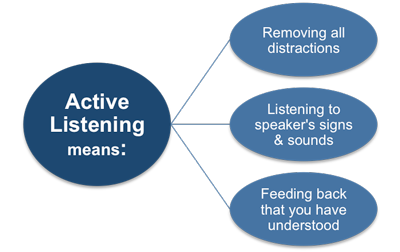Register now or log in to join your professional community.

 The importance of listening extends far beyond academic and professional settings. Understanding how to practice good communication even in your day to day life, among friends, family, and significant others, is important for a number of reasons: fostering good self-esteem, maximizing productivity, improving relationships, and even becoming a better speaker.
The importance of listening extends far beyond academic and professional settings. Understanding how to practice good communication even in your day to day life, among friends, family, and significant others, is important for a number of reasons: fostering good self-esteem, maximizing productivity, improving relationships, and even becoming a better speaker.
It’s easy to mistake listening as a simple, passive task, but it requires more than just the ability to absorb information from someone else. Listening is a process, and an active one.
In this guide, we’ll go over the stages that compose the listening process, and the importance each one plays in your ability to communicate effectively with others.
The Five Steps to Better ListeningThe listening process can be broken up into five distinct stages: receiving, understanding, remembering, evaluating, and responding. This is the model most commonly referred to when analyzing good communication, because it helps isolate the necessary skills required at each individual step in the process.
The most important thing to keep in mind though is that listening is, indeed, a process, and one that requires effort. Once you understand how each part makes up the whole, you’ll come out a better thinker, listener, speaker, and communicator. Let’s begin.
This is the first and most basic stage of the listening process: the act of actually absorbing the information being expressed to you, whether verbally or non-verbally. Not all communication is done through speech, and not all listening is done with ears.
No matter how you’re communicating with another person, the key at this stage is to pay attention. Focus all of your energy on them, by following these three simple tips:
This is the point in the listening process where you’re able to plan your response. Understanding takes place after you’ve received the information from the speaker, and begin to process its meaning.
You can do this by asking questions, or rephrasing parts of the speaker’s message. This allows you to demonstrate your active engagement with their words, and help you better understand their key points.
What good would it do in a conversation if you forgot everything the speaker had just said? This stage of the listening process might seem very similar to the first two, but it goes beyond merely absorbing and processing information.
Remembering is about retaining that information, and the most effective way to do so in an important conversation is to move the key elements of a message from your short-term memory, and into your long-term memory.
There are numerous methods for doing this:
Improve your memory with these courses on mastering your memory, and easy techniques to improve your memory today.
It’s at this stage where you can begin to prepare for your response, but remember: you’re still a listener, not a speaker. After the message has been absorbed, processed, and remembered, you can begin to sort the information into pieces.
After interpreting the speaker’s message, through a combination of understanding, retention, and evaluation, you’re ready to form a response.
5. RespondingIf you’ve completed the receiving, understanding, remembering, and evaluating portions of the listening process, responding should be easier than ever. You’ll be prepared to address the speaker’s most important points, with an awareness of the circumstances and context surrounding their words.
It’s important to understand the transition between listening and speaking though, and be aware of the ways responding is still a part of the active listening process.
While each stage seems like a lengthy process, this all happens in a very short amount of time, and should feel natural during a conversation. All you’re doing by practicing these tips is making yourself more conscious of the way you communicate, and the bad habits you should avoid in the listening process.
Listening is the most important part of communication, because if you fail to understand the message being expressed to you, you will also fail in providing a substantial and meaningful response. This is the root cause of many arguments, misunderstandings, and complications, whether at home, school, or work.
Being able to take control of the listening process will turn you into a better communicator.

The answer is nicely covered by Ms. Ghada in detail.
My last 2 cents is in the form of the following illustration.


I fully agree with Ms.Ghada answer, I don't think I have anything more to add.

Agree with Ghada Eweda answer <<<<<<<<<<<<<<<<<

fyll agree with great answer given by Great Mrs. Ghada

Thanks for invitation
I think it one of High Effect Communication skill for any manager because he will have good benefit at team management .

i fully agree with the answers been added by experts..........thanks.

Active listening is a way of listening and responding to another person that improves mutual understanding. Often when people talk to each other, they don=t listen attentively. They are often distracted, half listening, half thinking about something else.

Agree with the answer posted here

Thank you for the invitation... I will agree with the answers .. Variety of correct info and opinions .. Nothing to add !





Do you need help in adding the right keywords to your CV? Let our CV writing experts help you.